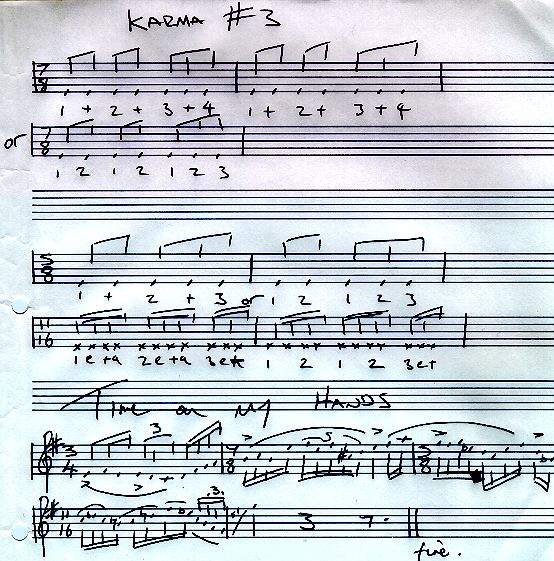"Energy can neither be created or destroyed, merely converted into other forms."
Above is the common principle of energy conservation which has been implemented by physicists for many years. Human beings continually encounter the same principle in their every day lives and as musicians are at least partially human they are no exception. Our mental and physical energy levels constantly fluctuate throughout our existence and this may account in part for the changes in our level of creativity. This suggests than an understanding of our internal energies would help us to utilize them more efficiently.
Primarily we must distinguish between mental and physical energy. Although we need physical energy to allow us to create, a constant flow of mental energy is more important when looking at creativity. There are many sources of this energy, and depending on your disposition it could originate anywhere from the divine to Playboy.
In light of the conservation principle, it is apparent that we need to focus this mental energy in order to achieve our musical goals. In short, attempting to accomplish 4 million things at once is detrimental as our creative energies are converted into other areas. However, in reality it is very difficult to achieve a focus as there are too many other things going on in our lives. Firstly we need to organize and prioritize our musical endeavors, putting the most important first. This is simple in theory but not so in actual practice. Many individuals like to write things down on paper so that they have a clear map of their current projects and this in turn makes it easier to see separate goals. Meditation is another common technique which allows us to focus mental energy each day and it is widely practiced by many musicians.
The next problem encountered is that of collision with external forces seemingly out with our control..
"A body will continue in it's original state of motion or rest, until it is acted upon by an equal or unbalanced force."
As Newton puts it, everything is fine until we hit a problem. Sometimes distractions occur, having to pay your rent, clean your home or file for divorce, and these drain our creative energies. Every musician dreams of a supportive, balanced environment were they can write record and perform till they are blue in the face. Perhaps the key to achieving this is balance, as only in conjunction with this can we achieve all our ambitions. If we 'roll with the punches', balance is continually restored as we compensate for the force exerted on us by exerting an equal and opposite force.
The use of complex time signatures is continually growing in the current guitar scene and thus an understanding of them will stand most guitarists in good stead. As well as this it provides yet another compositional tool.
Let's start with that favorite complex time of 7/8, which is essentially a 4/4 bar with one 1/8 note missing, so it can be counted like 1 + 2 + 3 + 4, 1 + 2 + 3 etc. It is also commonly counted in groups of 2 and 3, i.e.. 1 2, 1 2, 1 2 3 (see example).
Following this line of thought 5/8 could be counted 1 + 2 + 3, 1+ 2 + 3 etc., or 1 2 , 1 2 3, 1 2 , 1 2 3 (see example).
This can be continued with time signatures like 11/16 which is a bar of 3/4 with the last 1/16 note missing i.e. 1 e + a 2 e + a 3 e + , 1 e + a 2 e + a 3 e + etc. (see example) or 1 2 , 1 2, 3 e + etc. Now granted this in not easy to count but a little practice will soon acquaint you with these concepts and pave the way to some interesting arrangements.

Scottish guitarist Gerry Magee has recently completed work on his debut solo album, entitled "The Middle Pillar". He has been teaching guitar privately for five years to students of all styles and abilities.
Prior to recording "The Middle Pillar", Gerry performed as a guitarist and composer for the group Serenade on their second release, "The 28th Parallel".
